| Listing 1 - 8 of 8 |
Sort by
|
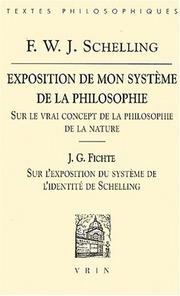
ISSN: 02497972 ISBN: 2711614530 9782711614530 Year: 2000 Publisher: Paris : Librairie J. Vrin,
Abstract | Keywords | Export | Availability | Bookmark
 Loading...
Loading...Choose an application
- Reference Manager
- EndNote
- RefWorks (Direct export to RefWorks)
Book
ISBN: 1139816055 0511999887 Year: 2000 Publisher: Cambridge : Cambridge University Press,
Abstract | Keywords | Export | Availability | Bookmark
 Loading...
Loading...Choose an application
- Reference Manager
- EndNote
- RefWorks (Direct export to RefWorks)
The Cambridge Companion to German Idealism, first published in 2000, offers a comprehensive, penetrating and informative guide to what is regarded as the classical period of German philosophy. Kant, Fichte, Hegel and Schelling are all discussed in detail, together with a number of their contemporaries, such as Hölderlin and Schleiermacher, whose influence was considerable but whose work is less well known in the English-speaking world. The essays in the volume trace and explore the unifying themes of German Idealism, and discuss their relationship to Romanticism, the Enlightenment, and the culture of seventeenth- and eighteenth-century Europe. The result is an illuminating overview of a rich and complex philosophical movement, and will appeal to a wide range of readers in philosophy, German studies, theology, literature, and the history of ideas.
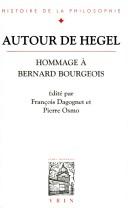
ISSN: 02497980 ISBN: 2711614336 9782711614332 Year: 2000 Publisher: Paris: Vrin,
Abstract | Keywords | Export | Availability | Bookmark
 Loading...
Loading...Choose an application
- Reference Manager
- EndNote
- RefWorks (Direct export to RefWorks)
Idealism, German --- Idéalisme allemand --- Hegel, Georg Wilhelm Friedrich, --- Bourgeois, Bernard --- Idéalisme allemand

ISBN: 0521651786 0521656958 9780521656955 Year: 2000 Publisher: Cambridge Cambridge University Press
Abstract | Keywords | Export | Availability | Bookmark
 Loading...
Loading...Choose an application
- Reference Manager
- EndNote
- RefWorks (Direct export to RefWorks)
Idealism, German. --- Philosophy, German --- 141.13 --- 141.13 Metafysisch idealisme --- Metafysisch idealisme --- Idealism, German --- German idealism --- History of philosophy --- anno 1800-1899 --- anno 1700-1799 --- Germany --- Idealism [German ] --- Philosophy [German ] --- 18th century --- 19th century --- Philosophy, German - 18th century. --- Philosophy, German - 19th century.
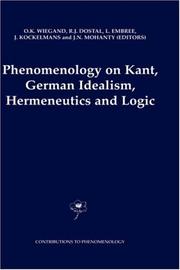
ISBN: 079236290X 9048154480 9401594465 9780792362906 Year: 2000 Volume: 39 Publisher: Dordrecht : Kluwer,
Abstract | Keywords | Export | Availability | Bookmark
 Loading...
Loading...Choose an application
- Reference Manager
- EndNote
- RefWorks (Direct export to RefWorks)
Joseph 1. Kockelmans Pennsylvania State University In July of 1999, Prof. Dr. Thomas M. Seebohm turned 65 years old, and thus en tered mandatory retirement. His friends, colleagues, and former students thought that it would be fitting to celebrate the event of his retirement with a volume of essays in his honor, in order to render homage to a great human being, an outstanding and dedicated teacher, a highly regarded philosopher and scholar, but above all a dear friend and colleague. When the editors thought about a unifying theme for the anthology, they finally settled on the research interests of Professor Seebohm; in their view the vast do main of his competence and interests would leave all participants the freedom to select a topic of their own choice that would nonetheless lie within this large realm as well as within the area of their own research interests. Professor Seebohm's research interests encompass work in Phenomenology, Hermeneutics, German Idealism (Kant in particular), History of Philosophy, Phi losophy of the formal sciences (of Logic in particular), Philosophy of History, Methodology and Philosophy of the Human Sciences, (including Psychology and Sociology), History of 19th Century British Empiricism (Mill), American Pragma tism, Analytic Philosophy, Philosophy of Law and Practical Philosophy, the devel opment of the history of philosophy in Eastern Europe, especially in the Middle Ages, but also in the nineteenth century.
Phenomenology. --- Idealism, German. --- Logic. --- Idealism, German --- Phenomenology --- Philosophy, Modern --- German idealism --- Logic --- Argumentation --- Deduction (Logic) --- Deductive logic --- Dialectic (Logic) --- Logic, Deductive --- Intellect --- Philosophy --- Psychology --- Science --- Reasoning --- Thought and thinking --- Methodology --- Phenomenology . --- Epistemology. --- Modern philosophy. --- Language and languages—Philosophy. --- Modern Philosophy. --- Philosophy of Language. --- Modern philosophy --- Epistemology --- Theory of knowledge
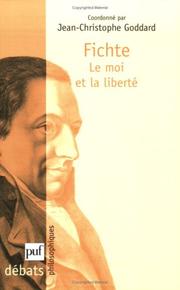
ISBN: 2130510531 9782130510536 Year: 2000 Volume: *6 Publisher: Paris PUF
Abstract | Keywords | Export | Availability | Bookmark
 Loading...
Loading...Choose an application
- Reference Manager
- EndNote
- RefWorks (Direct export to RefWorks)
La philosophie de Fichte est une philosophie du moi. Est-ce à dire qu'il faut y voir une philosophie de La subjectivité finie, achevant en système l'idéalisme kantien ? Ou bien faut-il s'inquiéter de ce que le moi y soit aussi dit " absolu ", et chercher chez Fichte Les prémices des philosophies schettingienne et hégélienne de l'absolu ? Le but de ce volume est de convaincre que la philosophie de Fichte est plutôt une pensée originale de la construction duale, contradictoire, du moi humain en lequel sont à la fois opposées et réunies finitude et absoluité. Or le médium de cette synthèse vivante du fini et de l'absolu dans le moi humain, c'est la liberté comme libre choix d'elle-même. De sorte que, confondant volonté d'être soi et volonté d'être libre, la philosophie de Fichte est, comme philosophie du moi, philosophie de la liberté. Philosophie de la liberté, elle reste au double sens d'une pensée de l'autodétermination pratique du sujet fini et d'une pensée de l'absolu comme agir pur. C'est pourquoi l'intention de ce volume est de mettre en relief la valeur émancipatrice de la philosophie de Fichte tant sur le plan de l'action que celui de la spéculation.
Philosophical anthropology --- Fichte, Johann Gottlieb --- Cogito --- Duits idealisme --- German idealism --- Idealism [German ] --- Idealisme [Duits ] --- Idéalisme absolu --- Idéalisme allemand --- Idéalisme objectif --- Idéalisme subjectif --- Ik (Filosofie) --- Moi (Philosophie) --- Self (Philosophy) --- Philosophy, Modern --- Liberty --- Philosophie --- Liberté --- History --- Histoire --- Fichte, Johann Gottlieb, --- Liberté --- Fichte, Johann Gottlieb, - 1762-1814
Book
ISBN: 3791716972 Year: 2000 Publisher: Regensburg : Friedrich Pustet,
Abstract | Keywords | Export | Availability | Bookmark
 Loading...
Loading...Choose an application
- Reference Manager
- EndNote
- RefWorks (Direct export to RefWorks)
291.16 --- Idealism, German --- Religion --- -Religion, Primitive --- Atheism --- God --- Irreligion --- Religions --- Theology --- German idealism --- Verhouding tussen de godsdiensten. Verdraagzaamheid. Interreligieuze dialoog --- Philosophy --- -History --- Nietzsche, Friedrich Wilhelm --- -Verhouding tussen de godsdiensten. Verdraagzaamheid. Interreligieuze dialoog --- 291.16 Verhouding tussen de godsdiensten. Verdraagzaamheid. Interreligieuze dialoog --- -German idealism --- Religion, Primitive --- Philosophy&delete& --- History --- Nietzsche, Friedrich Wilhelm, --- Nietzsche, Friedrich --- Nietzsche, Friederich --- Nietzsche (friedrich), 1844-1900 --- Idealisme allemand --- Critique et interpretation
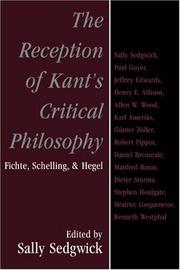
ISBN: 0521772370 0521039096 0511527268 9780521772372 9780511527265 9780521039093 Year: 2000 Publisher: Cambridge Cambridge University Press
Abstract | Keywords | Export | Availability | Bookmark
 Loading...
Loading...Choose an application
- Reference Manager
- EndNote
- RefWorks (Direct export to RefWorks)
The period from Kant to Hegel is one of the most intense and rigorous in modern philosophy. The central problem at the heart of it was the development of a new standard of theoretical reflection and of the principle of rationality itself. The essays in this volume, published in 2000, consider both the development of Kant's system of transcendental idealism in the three Critiques, the Metaphysical Foundations of Natural Science, and the Opus Postumum, as well as the reception and transformation of that idealism in the work of Fichte, Schelling and Hegel.
History of philosophy --- Hegel, Georg W.F. --- Kant, Immanuel --- Schelling, von, Friedrich W.J. --- Fichte, Johann Gottlieb --- Idealism, German --- Philosophy, German --- Idéalisme allemand --- Philosophie allemande --- Kant, Immanuel, --- Fichte, Johann Gottlieb, --- Schelling, Friedrich Wilhelm Joseph von, --- Hegel, Georg Wilhelm Friedrich, --- Influence. --- History --- -German idealism --- -Fichte, Johann Gottlieb --- Hegel, Georg Wilhelm Friedrich --- -Schelling, Friedrich Wilhelm Joseph von --- Influence --- Hegel, Giorgio Guglielmo Frederico --- -History --- Idéalisme allemand --- German idealism --- Schelling, Friedrich Wilhelm Joseph von --- Schelling, F. W. J. --- Schelling, Friedrich Wilhelm Joseph --- Schelling, Federico Guillermo José --- Kant, Emmanuel --- Kant, Emanuel --- Kant, Emanuele --- Hegel, Georg Wilhelm Friedrich. --- von Schelling, Friedrich Wilhelm Joseph --- Kant, I. --- Kānt, ʻAmmānūʼīl, --- Kant, Immanouel, --- Kant, Immanuil, --- Kʻantʻŭ, --- Kant, --- Kant, Emmanuel, --- Ḳanṭ, ʻImanuʼel, --- Kant, E., --- Kant, Emanuel, --- Cantơ, I., --- Kant, Emanuele, --- Kant, Im. --- קאנט --- קאנט, א. --- קאנט, עמנואל --- קאנט, עמנואל, --- קאנט, ע. --- קנט --- קנט, עמנואל --- קנט, עמנואל, --- كانت ، ايمانوئل --- كنت، إمانويل، --- カントイマニユエル, --- Kangde, --- 康德, --- Kanṭ, Īmānwīl, --- كانط، إيمانويل --- Kant, Manuel, --- Hēgeru, --- Hei-ko-erh, --- Gegelʹ, Georg, --- Hījil, --- Khegel, --- Hegel, G. W. F. --- Hegel, --- Hei Ge Er, --- Chenkel, --- Hīghil, --- הגל, --- הגל, גאורג וילהלם פרידריך, --- הגל, גיאורג וילהלם פרידריך, --- הגל, ג.ו.פ, --- היגל, גורג ווילהלם פרדריך, --- היגל, גיורג וילהלם פרידריך, --- 黑格尔, --- Hegel, Guillermo Federico, --- Hegel, Jorge Guillermo Federico, --- Heyel, Georg Wilhelm Friedrich, --- Higil, Gʼūrg Vīlhim Frīdrīsh, --- هگل, --- هگل، گئورگ ويلهم فريدريش, --- Arts and Humanities --- Philosophy --- Idealism, German - History - 18th century.
| Listing 1 - 8 of 8 |
Sort by
|

 Search
Search Feedback
Feedback About UniCat
About UniCat  Help
Help News
News